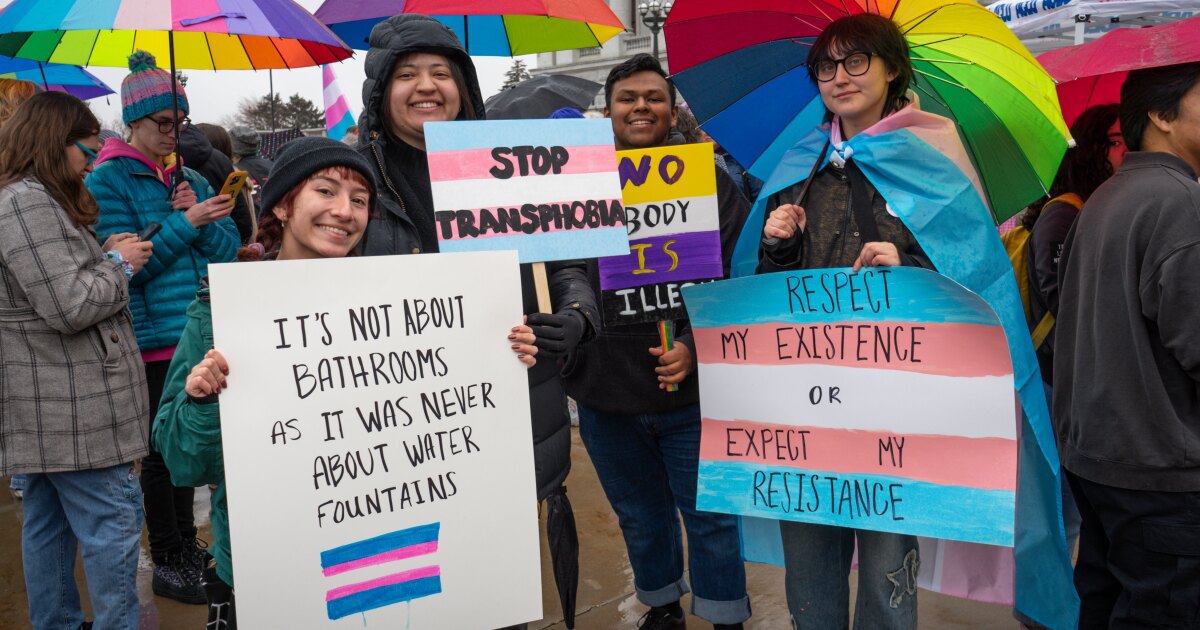
Within the first two weeks of Utah’s 45-day legislative session, the Republican supermajority rapidly passed two contentious bills. The first does away with diversity, equity and inclusion programs in K-12 schools, public universities and government agencies. The other bans transgender people from using a public restroom or locker room that aligns with their gender identity.
Republican Gov. Spencer Cox signed both bills on Jan. 30.
The speed at which Utah lawmakers address, debate and pass controversial bills at the start of this session mirrors a similar pace they set in 2023. In the opening weeks last year, they fast-tracked a ban on gender-affirming care for minors and the creation of a school voucher program.
Republican leaders have said front-loading the session with the most hot-button issues leaves more time for other business like the budgeting process, which is a constitutionally mandated role of the Legislature.
When it comes to diversity, equity and inclusion, Cox telegraphed his feelings in December, particularly how he believes the practices have influenced university hiring. He said so-called “diversity statements” in the hiring process are “bordering on evil.”
“We’ve been concerned about some DEI programs and policies, particularly with hiring practices, and this bill offers a balanced solution,” he said after signing the bill into law. “I’m grateful to the Legislature for not following the lead of other states that simply eliminated DEI funding with no alternative path for students who may be struggling. Instead, this funding will be repurposed to help all Utah students succeed regardless of their background.”
Instead of DEI offices, HB0261 allows for the creation of “student success offices” that are open to all students, regardless of race or ethnicity.
Critics point to 2020 when Cox and other influential Utah political and business leaders signed the Utah Compact on Racial Equity, Diversity and Inclusion in the wake of the Georgel Floyd protests. Cox’s strong stance against DEI initiatives seems in contrast to some of the provisions of that document, notably “eliminating racial and ethnic disparities requires our significant effort and investment.”
Utah’s political climate has changed since 2022. Cox is running for a second term, and he faces primary challengers from his political right.
HB0257, which restricts what bathrooms transgender people can use in publicly owned and controlled buildings, like public schools and county recreation centers, follows the lead of nine other states that have enacted similar laws.
Republican Rep. Kera Birkeland said the bill “doesn’t target one specific group,” rather “it creates privacy for every Utahn.” She added the legislation is needed to prevent “bad actors” from committing acts of lewdness or voyeurism inside a private space.
Florida and Utah are the only states that currently criminalize transgender people for occupying the wrong sex-designated bathroom, locker room or changing room.
Republican Sen. Dan McCay, said a transgender person is “still at risk” of criminal charges if they use the incorrect sex-designated bathroom and don’t engage in inappropriate behavior.
“A person should go to the bathroom of their birth sex,” he said. “And if there’s questions, they ought to find a non-gender specific bathroom.”
The bill does mandate the addition of more public single-occupancy and unisex stalls. It also requires all existing government-owned and controlled facilities to have at least one gender-nonspecific bathroom available.
The governor remained relatively quiet on transgender issues this year before signing the bill into law. Even then, his remarks were brief.
“We want public facilities that are safe and accommodating for everyone and this bill increases privacy protections for all,” Cox said in a statement.
When the Legislature passed a last-minute ban on transgender girls participating in school sports in 2022, Cox vetoed the legislation, saying there were “several fundamental flaws.” The GOP-dominated Legislature later called itself into a special session, overriding the veto in a party-line vote. A court-ordered injunction has been placed on the law, preventing it from taking effect.
Although the Legislature has already passed two hot-button bills this session and seen them become law, the Legislature is not done tackling touchy subject areas. The House already approved a bill pertaining to so-called “sensitive materials” in public schools and will debate and vote on where incarcerated transgender people can be housed inside state jails and prisons.



